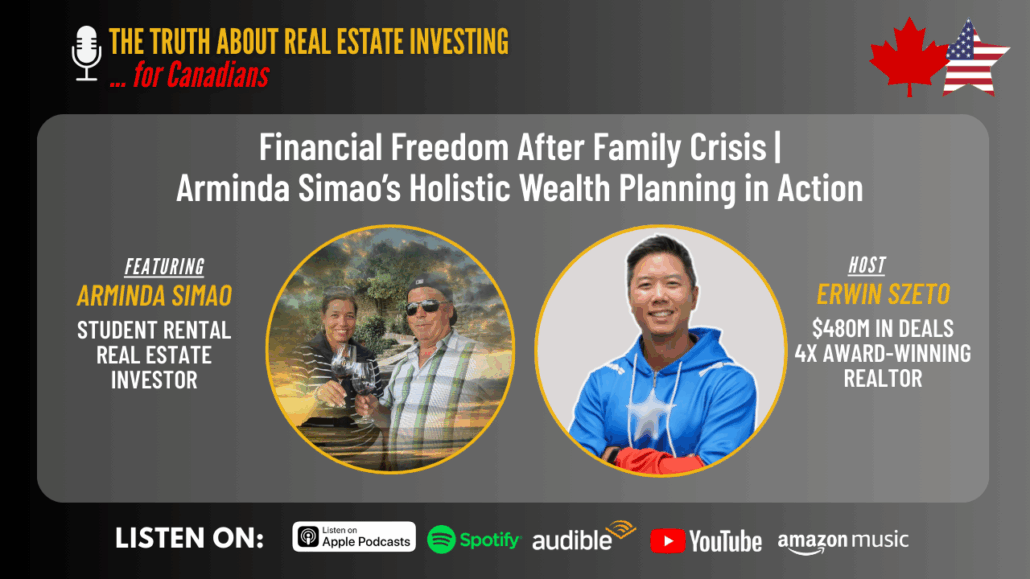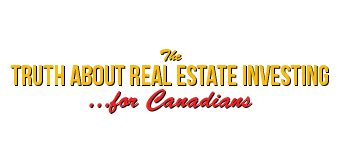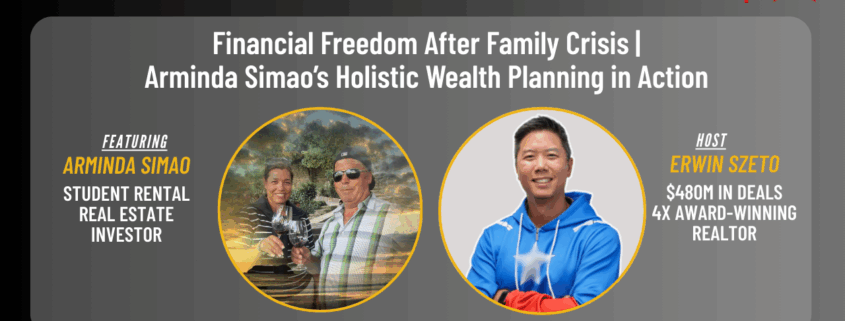From Family Crisis to Debt-Free Kids: Holistic Wealth Planning in Action

Recorded: November 2022
Guest: Arminda Simao
Host: Erwin Szeto, The Truth About Real Estate Investing for Canadians Podcast
Building a Wealth Plan with Student Rentals
When Arminda and her late husband Frank bought two student rentals near McMaster University in 2015, they weren’t chasing a trend. They were building a plan. With guidance from me as their Realtor and investment specialist, they targeted solid properties just outside the campus hot zone—close to transit and groceries—then upgraded them with student-friendly finishes and safety standards. The goal wasn’t door-count bragging rights; it was financial freedom for their family and a path to help their kids through school without debilitating debt.
Cash Flow and Stability Through Real Estate Investing
Within months, they owned two income properties, each configured for multiple student rooms. Rent supported expenses and created net cash flow—about $1,500/month across both houses—while giving their daughter Alexia a safe place to live during undergrad. The plan worked because it balanced fundamentals: quality renovations, conservative financing, and a steady rental niche with built-in turnover (students graduate, rents reset).
The Role of Insurance and Pensions
Then life changed. Frank—healthy, proactive about checkups—was diagnosed with glioblastoma, an aggressive brain cancer, with a 12–18 month prognosis. Overnight, the plan’s resilience was tested. What carried the family wasn’t just real estate cash flow; it was the right mix of real estate, insurance, and a pension. A $100,000 critical illness payout created breathing room at diagnosis. Life insurance later provided stability. Most importantly, Frank’s union pension continued as survivor income for Arminda—a predictable cash flow for life. For most Canadian investors, that kind of pension is the dividing line between uncertainty and confidence in retirement.
Insuring the Family vs. Insuring the Mortgage
Arminda also learned the difference between insuring the mortgage and insuring the family. During a refinance, the bank offered mortgage life insurance; they declined. After Frank’s passing, Arminda regretted that decision because the rental mortgages remained. The practical takeaway for Canadian investors: rather than lender-tied mortgage insurance (declining balance, lender as beneficiary), consider adding a death benefit to a personally owned life insurance policy. It’s flexible, portable across lenders, and allows the family—not the bank—to decide whether to retire debt, fund education, or reinvest.
Student Rentals That Stand the Test of Time
Despite the hardship, the long-term outcomes speak for themselves. Alexia advanced through dental school; Leandro completed denturism and is working in his field. The rentals kept performing—even through the pandemic—thanks to student demand and disciplined operations. Arminda set high standards (safety, cleanliness, responsive maintenance), relied on her network (contractors, landscapers), and empowered tenants to help with showings and referrals. The result: strong retention, smooth turnovers, and market-aligned rents over time.
Lessons for Canadian Investors
- Real estate builds wealth when you buy right, renovate to standard, and price for quality.
- Insurance provides liquidity and flexibility when life happens—critical illness and life insurance are not “nice to have”; they’re essential.
- Pensions sustain stability. If you don’t have a defined-benefit pension, build your own with positive-cash-flow income properties and pension-style solutions (segregated funds or annuities).
- Insure the family, not just the mortgage. Increasing personal life insurance death benefit typically beats mortgage insurance for flexibility and estate efficiency.
- Think holistically: real estate + insurance + pension + estate planning = resilience.
This re-release is perfectly timed with our Wealth Summit 2025 and the launch of iWIN Wealth Planner—a holistic, one-stop shop for wealth planning. If you’ve ever wondered, “Will I have enough to retire—and how much will I leave for my kids?”—Arminda’s story shows how a plan turns those questions into answers.
Wealth Summit 2025 – September 27th, 2025 | Oakville & Online
We’re bringing back the same energy and insight that made our Wealth Hacker Conferences legendary, where Grant Cardone and Jesse Itzler once took the stage, but this year, the focus is on what really matters for long-term financial freedom:
- Best practices in financial and estate planning
- How to build or replace a pension
- Protecting your wealth and minimizing taxes legally
- Wills, power of attorney, and intergenerational wealth transfer
This will be an intimate, high-impact event with only 40 in-person seats in Oakville, plus limited online access. If you’re serious about securing your financial future, you won’t want to miss it.
🎟️ Save your spot now
⚡ Don’t wait—seats are already filling up!
10 Essential Q&As on Real Estate, Insurance, and Building Your Own Pension
1. What’s the safest starting strategy for Canadian real estate investors?
Focus on student rentals near transit and groceries, renovated to a high standard with proper life-safety. This niche offers steady demand and natural turnover for rent resets.
2. How did real estate help Arminda achieve financial freedom?
Two cash-flowing student rentals generated about $1,500/month combined and provided housing for her daughter. That income, plus long-term appreciation, supported her family through a health crisis.
3. What role did insurance play in Arminda’s plan?
Critical illness paid $100,000 at diagnosis and life insurance provided tax-free funds later. Together they gave liquidity and stability when it mattered most.
4. Why is a pension so critical for retirement planning?
Frank’s union pension became lifetime survivor income for Arminda, providing predictable cash flow independent of markets or tenants. For many Canadian investors, a pension is the biggest factor in sustainable retirement.
5. Mortgage insurance vs. personal life insurance—what’s better?
Increasing a personal life insurance death benefit is usually superior to lender mortgage insurance. It’s flexible, portable, level coverage, and your family—not the bank—controls the payout.
6. How can investors without a workplace pension build one?
Combine positive cash-flow income properties with pension-style solutions like segregated funds or annuities. This creates reliable income streams that mimic a defined-benefit pension.
7. Did student rentals hold up during the pandemic?
Arminda had only a brief vacancy period, and demand rebounded strongly, with room rents moving higher. Quality properties in the right micro-market fared well.
8. What makes a student rental competitive?
Clean, safe renovations; responsive maintenance; and proximity to McMaster University, transit, and grocery options. Tenants will pay for quality and convenience.
9. How did estate planning affect Arminda’s outcome?
Wills, POAs, and beneficiary designations simplified decisions during crisis. The family’s existing life insurance and pension coordination made the transition manageable.
10. What’s the biggest takeaway for Canadian investors seeking financial freedom?
Holistic financial planning wins: real estate for growth, insurance for protection, and pensions (or pension replacements) for stability. Don’t just insure the mortgage—insure the family.
🎧 Listen to the full episode here
📜 Full Transcript
The full, cleaned transcript of my conversation with Arminda is available here for anyone who wants to dive deeper into her family’s journey, the role of real estate, insurance, and pensions, and how holistic wealth planning can reshape your financial future.
To Listen:
On Spotify: https://open.spotify.com/episode/51p1yn6DY4Rc6WBxs9wnUZ?si=Cp3P_mNzR0KxK0o3jLpg3A
Audible: https://www.audible.ca/pd/B0FRN9S517?source_code=ASSGB149080119000H&share_location=pdp
YouTube: https://youtu.be/4yDmdldNkpU
🦸♂️Household Hero? Here’s Your Next Step
If you’re a Canadian investor trying to build wealth safely and sustainably, Adam’s journey has valuable takeaways.
It might be time to revisit your current strategies—real estate, lending, or insurance—and ask:
- Do your investments match your long-term goals?
- Do you fully understand how your strategies work?
- Would a more conservative approach offer better peace of mind?
Real estate remains a powerful tool for building wealth, especially with careful underwriting and due diligence. Insurance can be useful too—but only if it supports your broader financial goals.
Need help with conservative, peace-of-mind investing—backed by Wall Street-style due diligence—plus financial planning with your best interests at heart?
Until next time, happy Canadian and USA Real Estate Investing.
Erwin Szeto,
Your Cross Border Investment Guy
Why I’m Investing in the U.S.
I’ve been investing in Ontario since 2005. It’s been a great run—starting with properties in the $100Ks, now reaching $800K–$1M. How much higher can it go? I don’t know.
The remaining appreciation potential doesn’t justify the risk. That’s why I advise clients to look to the U.S., where rental properties range from $150K–$350K USD, with rents between $1,400–$2,600/month.
These cash-flowing numbers are night and day compared to Canada. Plus, landlords have rights, there’s no rent control, and income is in U.S. dollars—which are stronger than Canadian dollars.
If you don’t believe that U.S. dollars are stronger, ask 100 non-Canadians what they’d prefer to be paid in.
To regain control of your retirement, check out the cash-flow properties at:
👉 iwin.sharesfr.com
How SHARE Makes It Easier
The best part? My U.S. investments are more passive than my Canadian ones. I work with SHARE, an asset manager that guides me through the entire process.
SHARE helps with:
- Finding quality income properties
- Structuring the legal and tax side
- Managing the property manager and insurance provider
- Saving time and money with preferred rates
They even advise on when to refinance or sell. SHARE supports investors across the U.S., which is why I plan to own in Tennessee, Georgia, and Texas. It’s like having a JV partner—without giving up ownership or control.
Final Thoughts
If increasing cash flow is your goal, I don’t know of a better strategy for most Canadians. Once more: iwin.sharesfr.com is where to see what boring, cash-flowing investing looks like on the path to financial peace.
This is how I’m making real estate investing great again—for my family and hopefully for yours too.
Sponsored by… Me!
This episode isn’t sponsored—except by my wife Cherry and me. Real estate investing is our life. It’s helped us build wealth and achieve peace of mind about retirement and our children’s future.
Interested in our systematic approach to real estate investing—the same one used by most of my podcast guests? Then check out:
📍 infinitywealth.ca/events
Till next time—just do it. I believe in you.
Erwin Szeto
W: erwinszeto.com
FB: facebook.com/erwin.szeto
IG: @erwinszeto
Disclaimer
As a committed advocate for transparent and responsible investing, I want to disclose that I am an Advisor to SHARE SFR (Single Family Rental). I hold equity in the company and earn referral commissions from clients I refer.
My endorsement of their model—focusing on positive cash flow and direct ownership—is based on personal experience and belief. Still, every investor should do their own due diligence.




Leave a Reply
Want to join the discussion?Feel free to contribute!